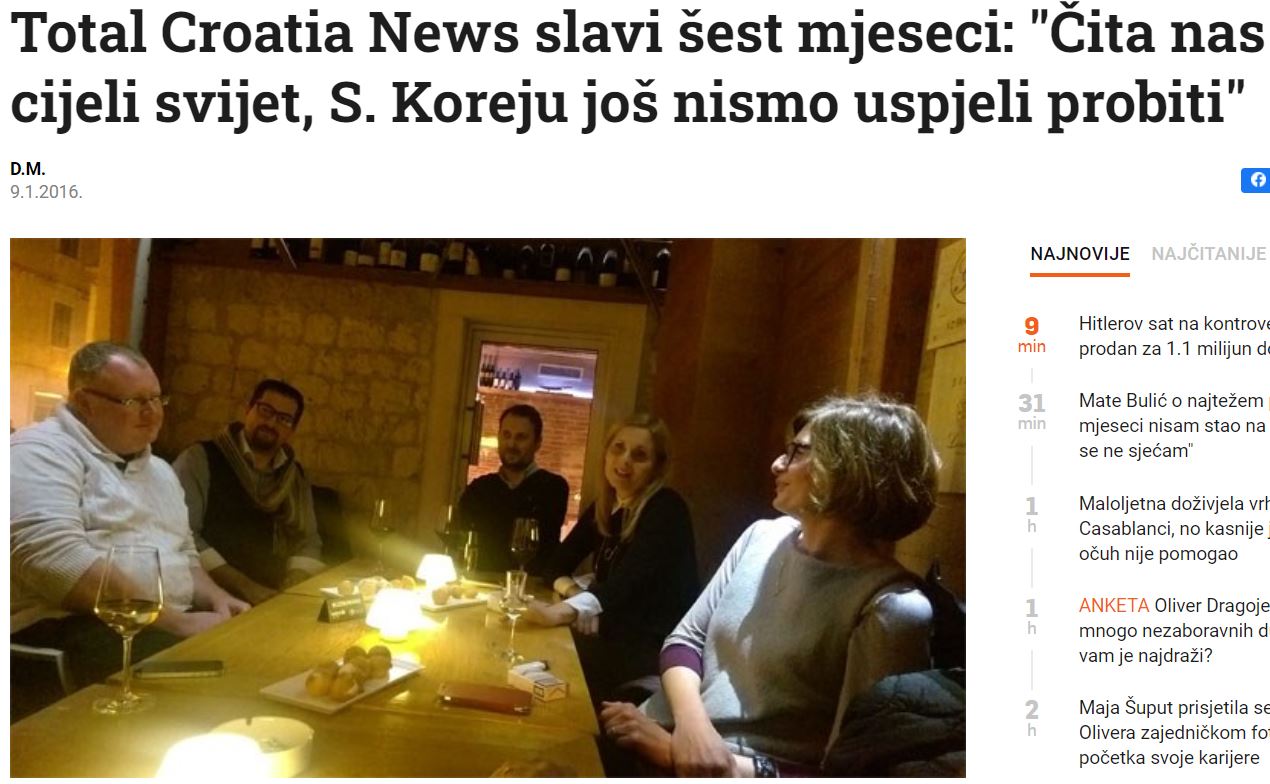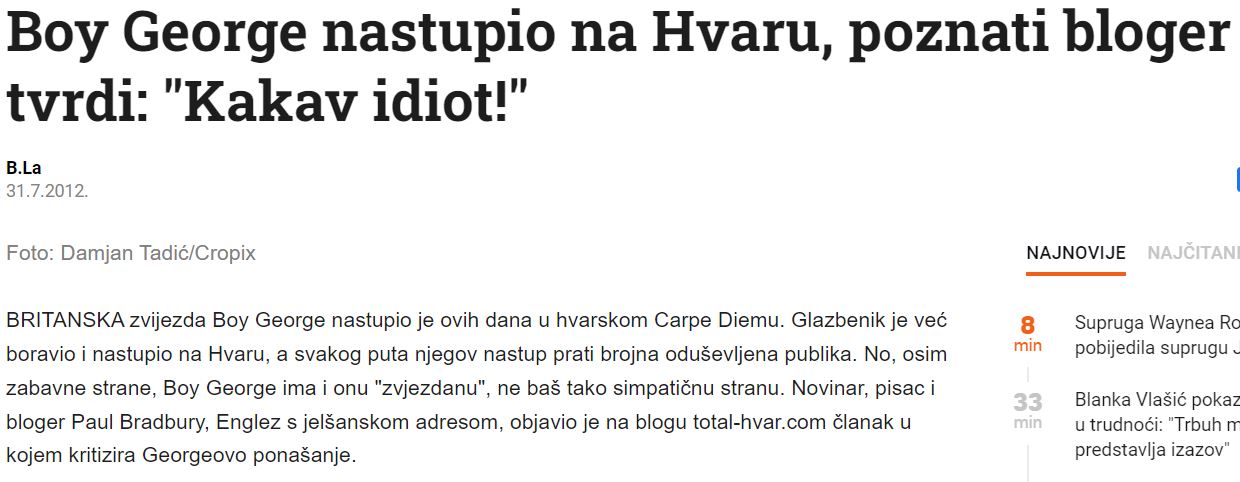Croatian Students Win Four Medals at Central European Olympiad in Informatics
ZAGREB, 30 July 2022 - Dorijan Lendvaj of Croatia and Alexandru Luchianov of Romania are the winners of the Central European Olympiad in Informatics, held in Varaždin, Croatia, on July 24-30.
Apart from Lendvaj and Luchianov, who share the first place with the highest score, gold medals, with fewer points won, also went to Patrick Pavić of Croatia and Michał Stawarz and Jan Strzeszyński of Poland.
Croatian representatives Marko Dorčić and Fran Babić also won two bronze medals at the event, organised by the Croatian association of IT specialists (HSIN).
Competing at the Olympiad were 52 high school students from Austria, Croatia, the Czech Republic, Germany, Hungary, Italy, Poland, Romania, Slovakia, Slovenia, Switzerland and Ukraine.
For more, check out our lifestyle section.
Gas Deal Between Croatia, Slovenia and Three Other EU members
ZAGREB, 30 July 2022 - In case of a real crisis in the supply of Russian gas and an EU emergency, member-states are expected to show solidarity, including by signing bilateral supply deals, and Croatia is currently preparing such an agreement with Slovenia, the Jutarnji List daily reports in its Saturday issue.
According to information available to the daily, talks will be held on solidarity deals also with Italy, Hungary and Austria, and they imply technical, legal and financial arrangements.
This mechanism was envisaged by a 2017 European regulation on supply security but so far only six solidarity deals have been signed in the EU. The first one was signed in December 2020 between Germany and Denmark, in late 2021 Germany and Austria signed such an agreement, and as many as four were signed this year - between Estonia and Latvia, Lithuania and Latvia, Italy and Slovenia, and Finland and Estonia.
The European Commission has in the meantime amended the regulation with articles which, if necessary, can be directly applied if there are no bilateral agreements.
The purpose of this is for countries to help one another in ensuring gas supply for their protected consumers (such as households and hospitals) also in the case of the biggest crisis.
Slovenia's minister said at an emergency European meeting on energy earlier this week that Ljubljana definitely wanted to conclude with Croatia an agreement to that effect before the end of the summer, and that a similar proposal had also been sent to Austria.
Under the latest EU agreement on reducing gas consumption by 15% in the period until the spring of 2023 (saving is currently voluntary but in case of an EU emergency, it will become compulsory), member-states need to update, by the end of the summer, their existing gas supply emergency plans and show how they intend to meet the reduction target, and report on it to the EC every two months.
As for members seeking solidary gas deliveries, they will be asked to show which measures they have taken to reduce domestic demand, the daily says.
For more, check out our politics section.
Ex-Minister Released from Investigative Custody
ZAGREB, 30 July 2022 - Former HDZ minister Tomislav Tolušić, whom the European Public Prosecutor's Office (EPPO) suspects of misappropriating European funds to build a winery, was released from investigative custody on Friday.
Tolušić was released at the EPPO's request after all 16 witnesses who he could have tampered with were questioned.
The former minister was remanded in custody on 8 July, after he and Željko Ferenc, an employee at the Paying Agency for Agriculture, Fisheries and Rural Development, were arrested in Virovitica.
Ferenc was released from investigative custody on Thursday after having been previously suspended.
Following their arrest, the EPPO said, without revealing their identities, that Tolušić, as an owner of a family-run farm, submitted an application for a project for the construction and equipment of a winery, worth HRK 4.65 million, with the Paying Agency for Agriculture, Fisheries and Rural Development in early May 2020, and that the level of co-financing with European funds was 70%.
In the application, Tolušić falsely stated that the financing of the project would be secured with a loan from a financial institution. However, he did not apply for a loan, and he financed the project with money whose legal origin cannot be proved, the prosecutor's office said.
Moreover, he did not inform the agency about the change in the financing, and was granted HRK 2.92 million in aid.
Tolušić applied to another tender, advertised by the agency on 2 June 2021 for the construction of new vineyards and the reconstruction of existing ones.
For the second application, Tolušić reportedly incited Ferenc to give a positive opinion on his application for the grant, although the application falsely stated that the piece of land in question had no crops planted in it, when in fact he had previously planted a vineyard there.
However, the Ministry of Agriculture and the Croatian Agency for Agriculture and Food refused to issue a positive opinion on the submitted technological project due to knowledge of the existence of a vineyard already planted there and due to other observed irregularities, the EPPO said.
After the rejection, Tolušić removed the grapevine that had been planted, obtained a new technological project and submitted it with the application.
He expected to receive a grant of HRK 1.5 million, with 85% being co-financed by EU funds, that is, more than HRK 1.3 million. However, the agency established that he did not meet the conditions, so the funding was not granted, the EPPO said.
For more, check out our politics section.
Peak Tourist Weekend in Split and Elsewhere in Croatia
July 30, 2022 - It is the peak tourist weekend in Croatia, and the number of people trying to get to their destinations is causing problems and delays in many places.
Split is filled with tourists, in this peak tourist weekend, and there are more coming through these days. It is expected that over 50,000 people will land in over 200 airplanes at the Split airport today. Croatian Radiotelevision also reports that the ferry port is expecting to see over 70,000 passengers and around 15,000 vehichles arriving or departing today.
Jelena Ivulić from Jadrolinija explains to HRT that the passengers have been arriving in great numbers since the early morning. They had to establish an out-of-schedule line towards Supetar yesterday afternoon, and there was another one this morning already. They are expecting more of those in the afternoon. The same goes for the return from Supetar to Split.
She says that it's really busy, and that the passengers need to be patient: everyone will eventually get to their destinations! They did so last weekend as well, and it was also remarkably busy. There are many passengers traveling to Ancona as well.
And Split is not the only place in Croatia that's full of people on this Saturday: HAK reports that many Croatian highways are also extremely busy, especially the directions towards the seaside. The A1 highway (Zagreb - Split - Ploče) has a lot of traffic in both directions and a 7-km queue at the entrance of the Sveti Rok tunnel in the direction of Split.
On the Eastern side of Croatia, there is a 12 km queue at the Bajakovo border crossing with Serbia, for the passengers crossing eastbound.
It remains remarkable that the one spot in Croatia where we've gotten used to kilometres-long queues, the border crossings with Bosnia and Herzegovina near Neum, are nice and almost empty today.
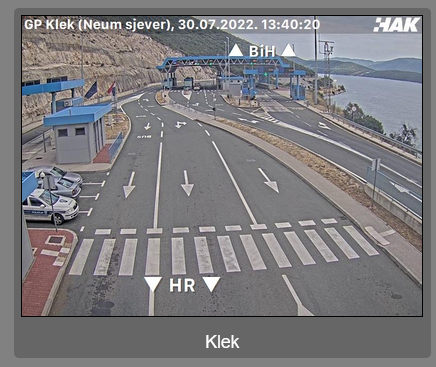
Screenshot from a HAK webcam
New Croatian Road Rules in Force Today: Here's What's Changed
July the 30th, 2022 - There are some brand new Croatian road rules in force as of today, so let's take a look into what's changing.
As Index vijesti writes, new Croatian road rules are in force today following amendments to the Law on Amendments to the Law on Road Traffic Safety, which introduces significant innovations in the legal regulations in the field of road traffic safety across the country.
It regards some comprehensive changes to the umbrella legal regulation on driving in Croatia, for which detailed preliminary analyses were made in order to improve existing practices from every perspective necessary for greater safety and more practical driving conditions, and all related professions and institutions were consulted during the drafting process as were people and road users themselves, they stated from the Ministry of the Interior (MUP).
Below are some of the most important changes to the Croatian road rules
New categories of vehicles – Personal means of transport such as electric scooters, etc
For the first time ever, the participation of electric scooters, electric unicycles, segways and the like on the country's road system has been fully and legally regulated. They have been classified into a special category of vehicles, for which a common name - a personal means of transport - was introduced.
A personal means of transport is a vehicle that isn't classified in any vehicle category in accordance with special regulations. It doesn't have a seat, and the working volume of its engine isn't greater than 25 cm³, the continuous power of the electric motor isn't stronger than 0.6 kW and when on a flat road, it doesn't develop a speed greater than 25 km/h. This of course regards self-balancing vehicles, such as unicycle with motor or electric drives, scooters with motor or electric drives, etc.).
Due to this new definition of the aforementioned means of transport and the introduction of a new term for it, other provisions of the Act relating to their safe participation in traffic have also been adjusted. The new law prescribes the right and manner of using the surfaces on which they can travel and the conditions that must be met by these vehicles and their drivers when using the roads.
Additionally, drivers of these so-called ''personal vehicles'', as well as bike riders, in accordance with the new Law, may not drive their vehicle using headphones, as this would reduce their ability to react quickly and safely drive the vehicle with their full focus. In case of a violation of the prescribed obligation, a sanction is prescribed, i.e. a fine in the amount of 300 kuna.
The new Act additionally prescribes areas where the driver is obliged to adjust the speed of their vehicle. As such, there are so-called ''other surfaces'' so that these new regulations, at least in that part, would also be applicable to new categories of vehicles, i.e. to vehicles which fall into the ''personal means of transport'' category. In addition, the new Croatian road rules allow drivers (category B) to drive motorised tricycles in Croatia, but this is subject to certain conditions.
The temporary incapacity to drive and the obligation of a doctor
The amendment to Article 233 introduces an obligation for all doctors, i.e. the doctor who examined or treated the driver or the patient's chosen doctor (GP) to warn the driver of their temporary incapacity, which cannot be longer than six months. Doctors are obliged to record the given warning in the patient's medical documentation.
After the expiration of the period of the driver's temporary incapacity, the driver will not be referred for another medical examination, and misdemeanor sanctions are prescribed for doctors who fail to notify the driver of their temporary incapacity to drive and who fail to properly record this information in the patient's medical documentation.
Sanctions are also in force for drivers who drive a vehicle on the road when they have been issued a doctor's warning about a temporary health condition which stops them from doing so.
However, it's important point out that the provisions on the temporary incapacity of the driver to drive a vehicle will come into force on the day of the adoption of amendments to the Ordinance on health examinations of drivers and candidates for drivers, which is under the jurisdiction of the Ministry of Health.
A deadline has been set for the Health Minister (Vili Beros), with the prior consent of the Interior Minister (Davor Bozinovic) to harmonise the Ordinance on health examinations of drivers and candidates for drivers ("Official Gazette/Narodne Novine", no. 137/15, 132/17 and 10/20) with the provisions of this Act within 12 months from the date of entry into force of this Act.
In relation to safety and health factors, the new Croatian road rules prescribe a sanction of 300 kuna for a driver choosing to drive a vehicle without a first aid kit in it when using the road, in accordance with the rulebook (pravilnik) prescribing the technical conditions of vehicles participating in road traffic.
A corridor for the passage of emergency vehicles
Crisis situations over the last two years have shown insufficient prominence and knowledge of the necessary reactions of road users in order to allow emergency vehicles and personnel uninhibited, urgent access to incident locations as easily and quickly as possible.
Therefore, these new Croatian road rules clearly define the need for a corridor for the passage of emergency services vehicles on roads with more than two traffic lanes in the event of an incident situation. This will be done in order for drivers to acquire the understanding of the need for the move, and to alter driving culture itself in the sense of there needing to be a uniform way of ensuring a safe corridor for the passage of emergency services vehicles. The corridor defined by the Law is uniform with other member states of the European Union.
An introduction of new terms and higher fines for speeding
New terms as part of new Croatian road rules have also been defined, such as "traffic zone in a protected cultural-historical entity'', ''contact zone", "assistive pedestrian means", "rider" and "automated vehicle".
For the first time, the participation of ''riders'' in road traffic has been regulated, and a new term has been introduced that describes a fully automated vehicle, i.e. a vehicle that can move along the road without the presence of a driver (a fully automated vehicle without a steering wheel).
In this regard, a sanction has also been prescribed for drivers who use vehicles with built-in driver assistance systems (partially automated vehicles) in such a way that the vehicle steers independently, and at the same time, i.e. while driving, the drivers don't even sit in the driver's seat, which means that they aren't in the proper ''form'' to react quickly in unexpected situations or unforeseen circumstances.
In addition, these new Croatian road laws regulate the ban on parking vehicles in places intended only for the charging of electric vehicles and enable the sanctioning of negligent drivers, as well as the relocation of vehicles that don't use charging services and are parked in places intended only for charging electric vehicles.
In accordance with the examples from practice, the obligation to submit credible data about the person who was driving the vehicle at the requested time has also been changed or expanded.
Namely, according to the new Croatian road rules, the user of a vehicle is required to provide reliable information about the person who was driving the vehicle at the time of the offense at the request of a police officer or an official from a local self-government unit. Since the current amount of the fine seems to have failed to deter drivers from committing violations, the new Croatian road rules have seen an increase in the amount of the fine issued for speed violations (which is most often imposed in the event of a traffic accident) from 500 kuna to 1,000 kuna.
Other important changes
The latest amendments to the Law also clarify the provisions of the article of the Act that refer to the responsibilities of a person who has access to dual controls of a vehicle during a driving test. In addition, license plates with red and green numbers and letters have been abolished.
It has been made much easier for both legal or natural persons to carry out the work they are engaged in (the production, upgrading, servicing, transport or retail sale of vehicles), i.e. the use of portable/removable license plates is now permitted for the purposes of transporting vehicles to their place of technical inspection and vehicle registration, for which until now, the use of test license plates was prescribed.
Persons who have completed at least an undergraduate university study or an undergraduate professional study, lasting three years in the traffic department (urban), are now allowed to perform the work of vehicle technical inspection supervisor and the work of vehicle testing and documentation processing, considering the compatibility of the education programme for the mentioned professions.
For more, make sure to check out our dedicated lifestyle section.
20 Ways Croatia Changed Me in 20 Years: 15. Running an English News Portal
July 30, 2022 - Twenty years a foreigner in Croatia. Part 15 of 20 Ways Croatia Changed Me in 20 Years - ever wondered what it is like running an English-language news portal as a foreigner in Croatia?
I have been out of my depth many times in my life. Running a humanitarian aid distribution operation on the edge of Siberia over an area the size of Germany (but without the infrastructure or communications) was an early highlight, to be surpassed by being given a project to organise the distribution of food, seeds and tools to 600,000 returning refugees and internally displaced people in eastern Rwanda on my second day in Africa two weeks after the genocide.
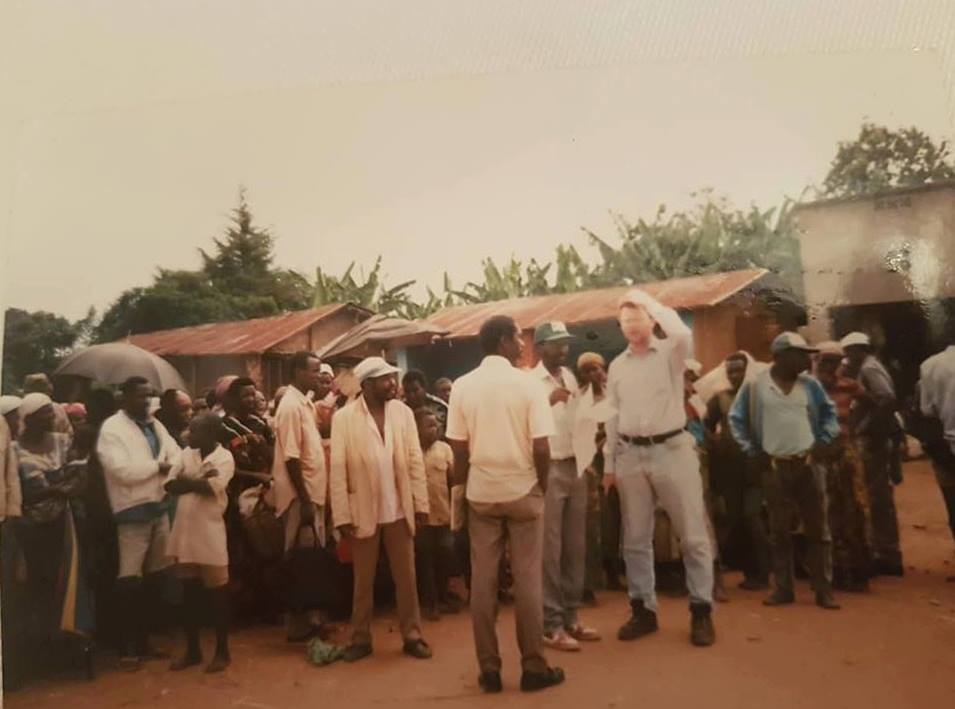
Being warmly greeted in 1992 at one of Russia's premier and secret military technology facilities outside Moscow with the words - Mr. Bradbury, we are delighted to have you here. Last month, we had a delegation the US Department of Defense, last week from the Israeli Defence Force, yesterday NASA, and here you are, our first British client. And without doubt, teaching English one-to-one to a Japanese 2-year-old sitting on his mother's knee in Hiroshima - never have 60 minutes been so long.
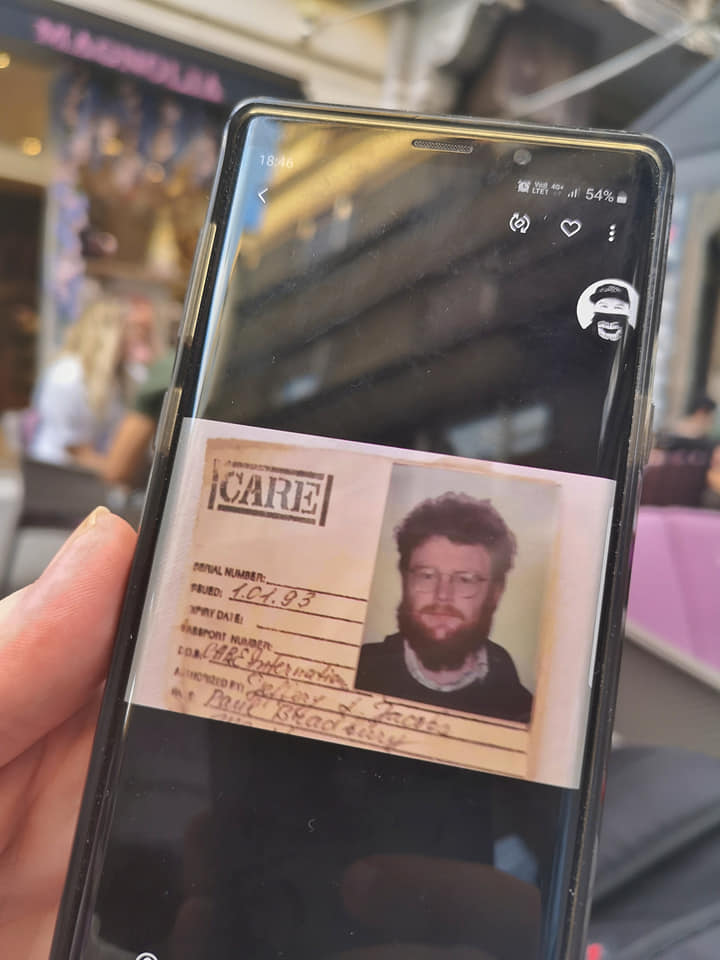
And then there was the case of running an English-language news portal in Croatia.
Over the last 7 years, I have read so many conspiracy theories about who is behind TCN - Putin, Soros, Greater Serbia, sometimes all three at the same time - how I am working for MI6, CIA, Mossad, Greater Serbia and FSB, and the millions bankrolling the portal that I am honestly in awe of how seriously people take TCN and the motives behind it.
I just wish the money bit was true...
If only they knew that it was conceived over a cold one in Jelsa by a Brit who really didn't have a clue about Croatia apart from his adopted island of Hvar, the area around Diocletian's Palace in Split, and Zagreb bus and train station, despite living in Croatia for 13 years.
So good was I that when I interviewed the then President Josipovic for Google News in his reelection campaign for a Canadian news portal, I had no idea which political party he was in.
But I saw an opportunity, for although Croatia had been in the EU since 2013, there was no regular English-language news portal. How hard could it be?
I roped in a couple of colleagues who were bilingual and knew Croatia much better than me, and we decided to give it a go. I called in a few favours with friends all over the country and asked them to contribute an article or two to make us look bigger than we were. I got a little financial help and some mentoring from two Croatian friends, and in early July, 2015, we were good to go.
In order to show how serious this new portal was, I worked hard to get some good initial interviews. The South Korean Ambassador was kind enough to give me an interview on the rise of Korean tourists to Croatia. But I wanted a really marquee interview to impress the world to announce our arrival, and I was particularly keen to woo the diaspora. As many did not speak Croatian, TCN should become their natural home for news about their homeland. How to impress them on Day 1?
Did I mention that I did not know anything about Croatia apart from my own little bubble when I started TCN?
I also knew nothing about the diaspora, or how diverse it was, or how passionate. That the diaspora in New Zealand was more Dalmatian than Croatian and had its origins in economic decline due to the devastating phylloxera and punitive taxes on wine by the Austro-Hungarians in the 19th century, while a major part of the Australian diaspora had its roots in fleeing Europe in 1945 and persecution by Tito into the 1960s and beyond. Two very different Croatias growing up in two countries the other side of the world.
I was unaware of any of this as I proudly completed my first star interview, with the then Croatian Foreign Minister. How impressive was that?
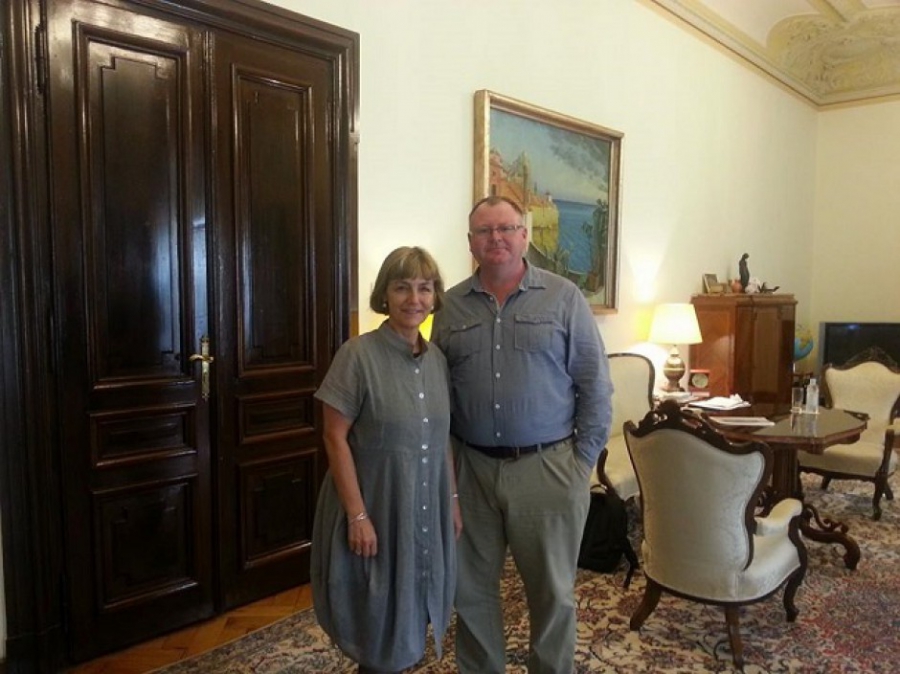
I proudly presented my star article for the first day, an exclusive interview with Vesna Pusic, complete with photo in the Foreign Minister's office.
I was pleased with myself, poured myself a cold one, and sat back to watch the favourable feedback, particularly from the diaspora audience I was so keen to cultivate.
"What is this Commie, Tito-loving garbage of a page? Probably funded by MI6. Unliking this page immediately." A summary of about 30 comments which left me severely deflated. What was wrong with Vesna Pusic?

It was the beginning of a 7-year love affair with my online trolls which we covered in a previous chapter - mostly from Australia - and who collectively have created my tombstone epitaph, of which I am immensely proud - 'Tito cock-sucking British Jew writing fluff to humanise mass murderers in the Jewish style when socially engineering a people for ruin.'
Beat that!
And so began a crash course in Croatian politics, which is VERY complicated. I learned the importance of having to identify where you were in 1991, for example, a date when true patriots were counted fighting for the homeland.
 Just what the hell had I gotten myself into?
Just what the hell had I gotten myself into?
And then my first exclusive! And quite a good one too.
Late one night, I got a message that Demi Moore was on Hvar. I checked the usual channels - Twitter etc. - and nobody had the story. I also had a photo from social media and so published. It was the first adrenaline rush from Google Analytics Real Time (a feeling I have come to know well over the years). Disappointingly, most of the Croatian media chose not to link back to my story (something I got VERY used to very quickly), but I was starting to get noticed.
We stumbled on, gradually finding our feet, and by the time he had been live 6 months, we were featured in the national media, including a statistic of which I was very proud - according to Google Analytics, we had been read in every country in the world, except North Korea.
Part of being noticed as a portal meant that the national media was starting to follow what we were putting out on a daily basis - the Demi Moore exclusive had perhaps made us worth following. I had already had my first taste of the media deciding to make you the story without your knowledge a couple of years earlier, when I was sent the link below, which roughly translates as Boy George performed on Hvar, a famous blogger claims: "What an idiot!"
My blog about Boy George keeping the media waiting until 3am and then only allowing us one question each (at which point I said I had no questions) had been picked up by the national media. At least I had the title of 'Famous Blogger.'
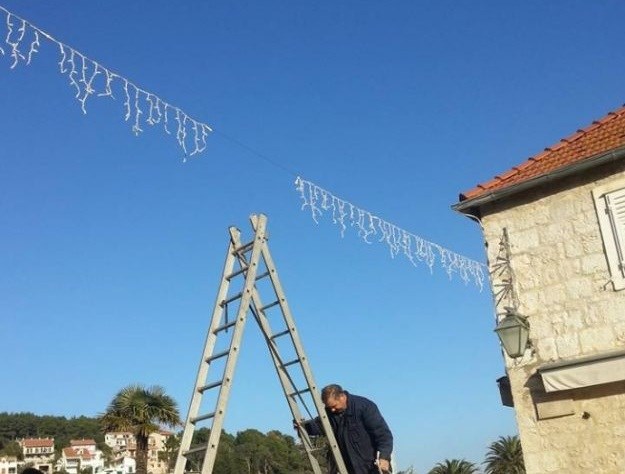
But nothing showed me the power (and uncontrollability - if that is even a word) of this new medium than a small little incident that was observed only by me in mid-December 2015 on a very sunny day on the main square in Jelsa.
There was quite an uproar in town after the Christmas decorations went up on the main square. The main star in the middle of the square as you entered was a 5-pointed star. Perfectly innocent to you and me, but an obvious Communist subversion to some. There was even a rumour that the star would be replaced with a star of Bethlehem to appease the right wing. The following day I saw two men loitering with a ladder, clearly up to something, but as the square was quite busy, they seemingly put on hold whatever they were planning.
Until, at least, everyone had left the square for lunch except for one person - me. Ordering another cold one, I watched in disbelief, snapping all the way with my phone, as they removed the offending star and replaced it with Bethlehem.
"What are you doing?" I asked innocently. "Is changing the star some kind of tradition?"
"We do not celebrate Communism here," came the gruff response.
What a title! A title that was the top story all over Croatia within 6 hours. And the story ran for WEEKS locally, with me making a cameo appearance at the political sketch in the Carnival some months later. The Mayor was in a political pickle - if he reinstated the star, he would be a Communist, and if he kept the star of Bethlehem, he would be an anti-Communist. He decided to compromise on having both stars.
"I wouldn't do that," I advised. "If you do, you will be announcing Jelsa as officially Croatia's first 2-star destination, hardly a great promo."
I also found a little niche of constructive criticism. The Croatian media and Croatian readers seemed to be interested in the views of a resident foreigner, and I found myself appearing in the media more. I found also that my foreign eye with (increasing) local knowledge gave me a different perspective on things, and I started to take more of a critical view of things as I saw them, particularly regarding Croatian tourism.
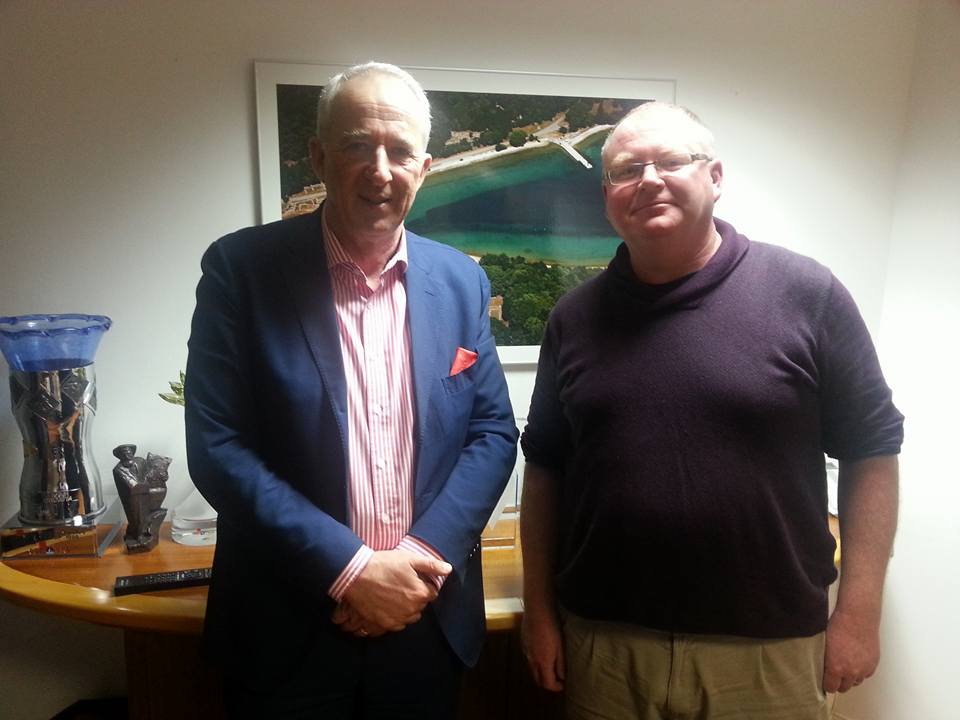
I published my critical appreciation of the Croatian National Tourist Board's flagship project, Croatia 365 at midnight on a Sunday, waking up to over 6,000 views and 7 messages in my inbox 6 hours later - all from Croatian media asking for a quote. And there we were, story of the day again.
There were also two phone calls, which led to two coffees the next day - one from the PA of the Minister of Tourism, and one from the then Director of the Croatian National Tourist Board, Ratomir Ivicic. It was the last time I met or was invited to meet a director of CNTB - the closest I have come since was being in the same courtroom, as we both gave evidence about a meme, one of two ongoing lawsuits against me from the national tourist board. You can follow my two ongoing lawsuits from the Croatian National Tourist Board in Diary of a Croatian Lawsuit, which will probably be a blog which will outlast TCN and be resolved in Strasbourg in 2063.
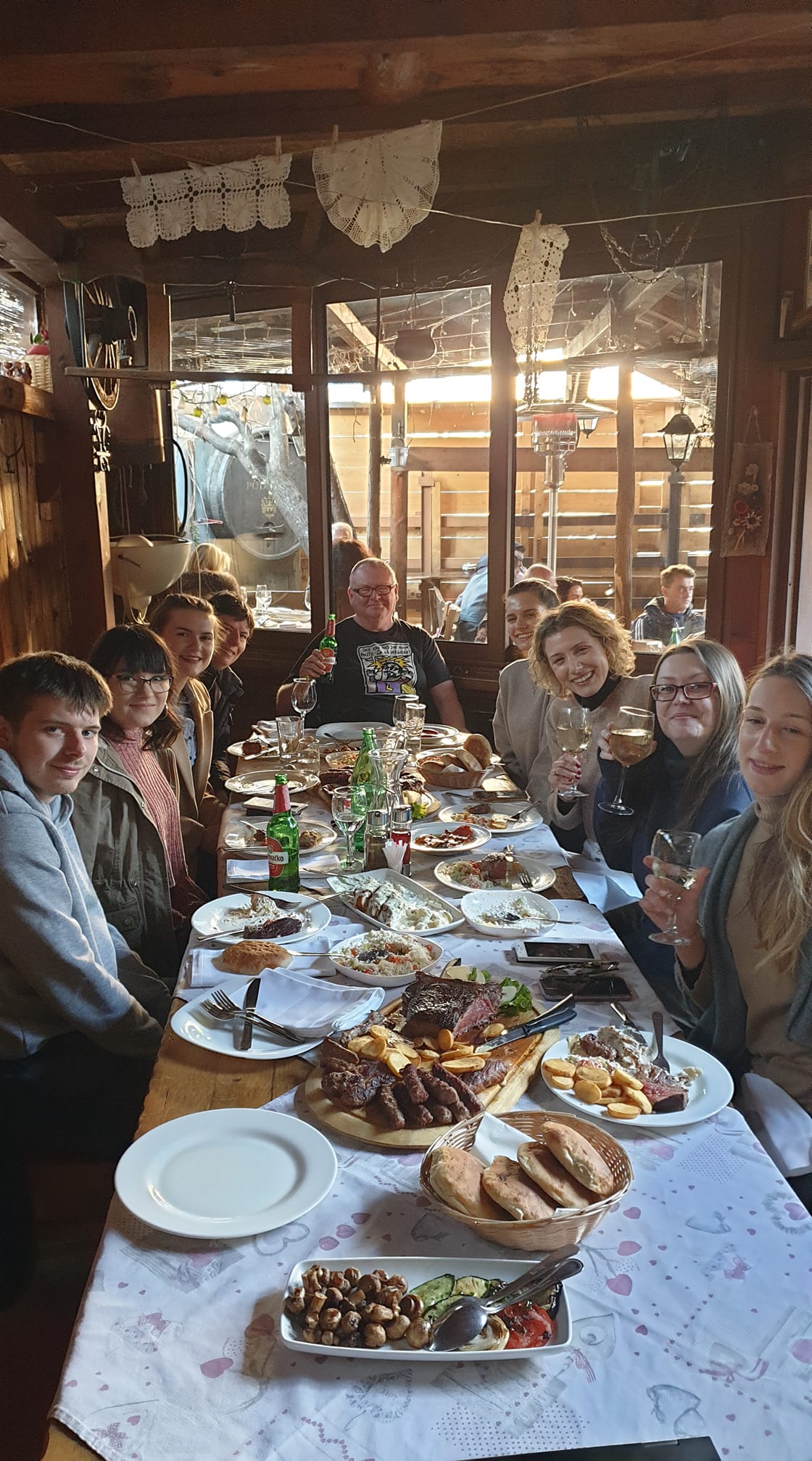
(TCN 2019 Xmas party... in March 2021, a symbol of my inefficiency)
Writers came and went. I readily admit that I am the most disorganised person in the world. A project which started with a beer and a laptop in Jelsa in 2011 with me in charge was going to struggle with growing pains. Thankfully, 2016 was a golden year for TCN. Three young ladies joined the team, and they all put their mark on things very quickly, getting me organised, bringing different perspectives, and crucially a much better understanding of Croatia than I possessed. Many have come and gone since - TCN and its devolved chaos is not for everyone - but Lauren Simmonds, Daniela Rogulj and Iva Tatic have been beyond magnificent, eventually telling me that they would run TCN much better without me in control. We tried it, and they were absolutely right.
Lauren is currently TCN editor, the best and quickest translator I have ever come across, who takes particular pleasure in the intricate workings of MUP bureaucracy. Her authoritative guides to residency issues are much appreciated by many, and she holds the record for the longest ever TCN article, a 10,000-word ode to Agrokor, which was utterly brilliant.
Dani is a Californian Dalmatinka who has really grown with TCN, and who has been the engine keeping it going from the moment she started. An incredibly capable all-rounder, with the best work ethic I have ever come across, she has blossomed in so many ways, from mentor to other writers and interns, to developing her name as a serious sports writer in the Croatian space. From press season-ticket holder at her beloved Hajduk, to the national stage. Seeing her reporting from Wembley, live on Talk Sport radio in London, and reporting for TCN at the Euros is a reminder of just how far TCN and Dani have come. She has really done a fantastic and comprehensive job on all sports, and I look forward to Dani's take reporting for TCN as an accredited journalist live from the World Cup in Qatar later this year.
Iva is also another excellent all-rounder, available to plug the considerable gaps at TCN where they appear. I have never met anyone in Croatia who knows as much on every subject as Iva, and her no-nonsense approach and organisation has made us a better unit overall.
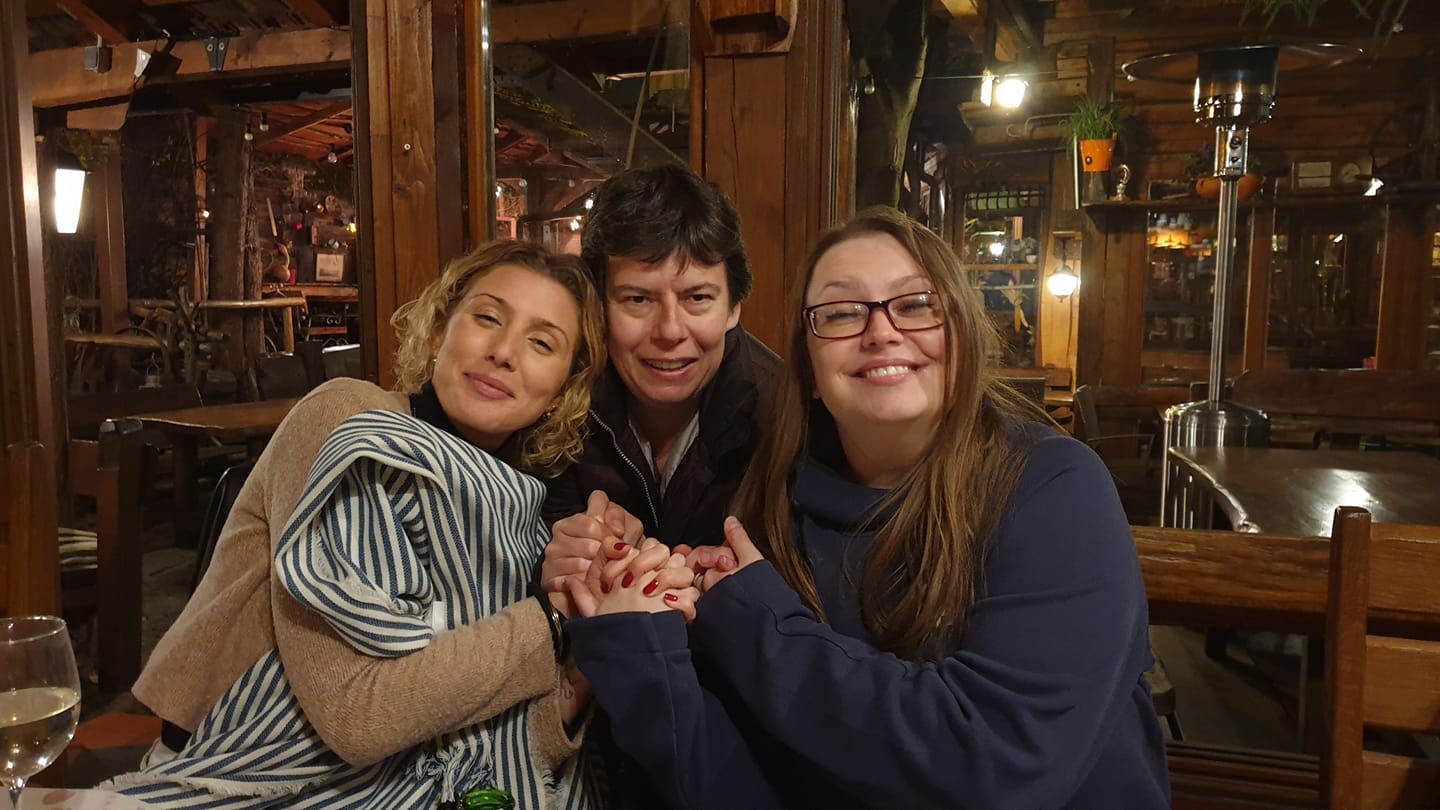
(TCN core team, from right to left - Daniela Rogulj, Iva Tatic, and Lauren Simmonds)
To the three of you - and all other TCN writers over the years - thank you for all your efforts.
An invitation to give a seminar to journalism students at the University of Zagreb was a journey into unchartered waters but led to an ad hoc TCN intern programme. Only 9 students (and some suspicious chap at the back nobody knew) turned up to hear me drone on, but three of those applied to be interns. We have had about 20 interns since we started, with mixed results, but it has been heartening to see at least 5 of them now in journalism jobs. I most frequently see young Donatella at press conferences reporting for Lider - it is one of life's tiny pleasures to see their careers evolving.
Being 100% independent has meant that we are free to choose our topics and pursue our own initiatives, some of which take hold and bear the most prosperous fruit. It is great to see how far the digital nomad story has come since we started advocating for it back in 2019, and I am very proud that we introduced Jan de Jong to the concept of digital nomad tourism (see above) - what Jan and his team have achieved since has been nothing short of phenomenal.
Ditto the partnership between TCN and Saltwater Nomads, the pioneers for me in the remote work space in Croatia. Tanja Polegubic has done fantastic things to lift Croatia's profile, and TCN has been a proud co-organiser of the award-winning Zagreb Digital Nomad Week and Dubrovnik Digital Nomads-in-Residence programme (both Saltwater concepts), and we are looking forward to Zagreb Digital Nomad Week 2022 in October - details to be announced very soon.
The longer we were around, the more interesting people we met, and inspirational pioneers such as Ognjen Bagatin unveiled a fascinating world of potential that I had no idea about - medical tourism.
The Croatian medical tourism story is fascinating, and there is SO much potential - Croatia really does have a world-class offer. It was a TCN highlight to accompany Ognjen and Andrea to Berlin and watch Bagatin Clinic named Best International Cosmetic Surgery Clinic of the Year at the 2019 International Medical Travel Journal awards in Germany (see above).

That was the second international flight of the year due to medical tourism, as my wife and I flew to Malaysia, where TCN picked an award at the inaugural Medical Travel Media Awards in Kuala Lumpur.
This happened shortly after my 50th birthday when I was coming to terms that I would perhaps achieve nothing in life. And then in the space of a few weeks, I won the medical travel award in Malaysia, was a published author in The Daily Telegraph, and - most unbelievably of all - started my career as a male model as the 22nd model in the fabulous Varteks campaign, Imperfect Guy in a Perfect Suit. When I learned that I was actually the first international male model in the company's 100-year history, my life was complete.
If there is a better job in the world than this - or one more random - I am yet to find it.
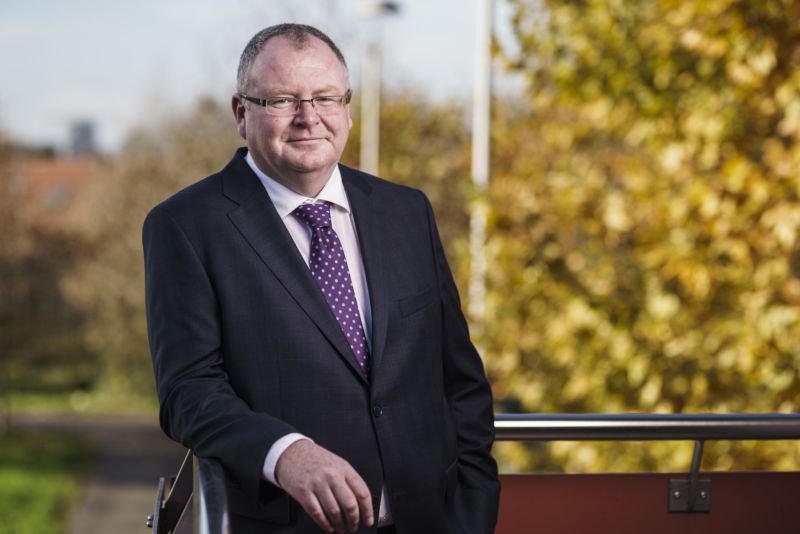
The more I got to know Croatia, the more I realised that the much more interesting stories lay away from the beach, and away from tourism. The nepotism and corruption and the status quo were the main factors behind the mass emigration, but it was only one part of the story. For there were so many good stories happening in Croatia, of young people staying and trying to make things work, despite the negativity. I came to realise that there is a default negative mindset in Croatia, where every new positive initiative is met with skepticism. Yes, it may work in every country in the world, but this is Croatia...
Attempting to inject a little positivity into the default negative mindset has been a fascinating little project for TCN, and we have had some successes. I was very honoured to be invited to speak at the excellent LEAP Summit on the topic Injecting Positivity into the Default Negative Croatian Mindset, which you can see above.
TCN's finest hour? Without a doubt March and April of 2020 when Dani and Lauren soared above their usual high standards, and together we knuckled down and did what we could to survive. Having lost almost every client overnight, Adsense was keeping us alive, and we decided to be the best resource out there for COVID-19 info, including live updates. It was punishing, but appreciated by many. And then, when we almost couldn't anymore, the devastating March 22 earthquake in Zagreb, which hit at 06:24 in the morning. I was already up and reporting on COVID when I got the first call in bed on Hvar at 06:25. By 06:39, we had broken the story in English on Google News, a story which was read by almost 150,000 people. The cooperation and teamwork with Dani and Lauren in those weeks was the best of my professional life.
And how could I fail to mention what was the most pressured but most rewarding TCN project of all, the Total Croatia Travel INFO Viber community, which was the only English-language resource in real time for COVID for a while, the brainchild of Kresimir Macan. It taught me so much, caused endless stress, but enabled thousands to visit Croatia during the pandemic. To receive 7 international awards, including from Polaris in London, was a proud moment indeed.

And there were some scary and very unpleasant moments along the route, not least in my beloved hometown of Jelsa, when I published a very well-researched analysis on the shady side of a public tender. The mayor (he of the 2-star destination above) was so incensed that he announced in a public meeting that he was suing me, as you can see below.
He never did, but things did get very unpleasant, so much so in fact that I ended up writing an open letter to the Prime Minister. And PM Plenkovic was generous enough to call me over for a chat, and even promised that he would never sue me.
And - so far - he has been true to his word. Thanks, PM.
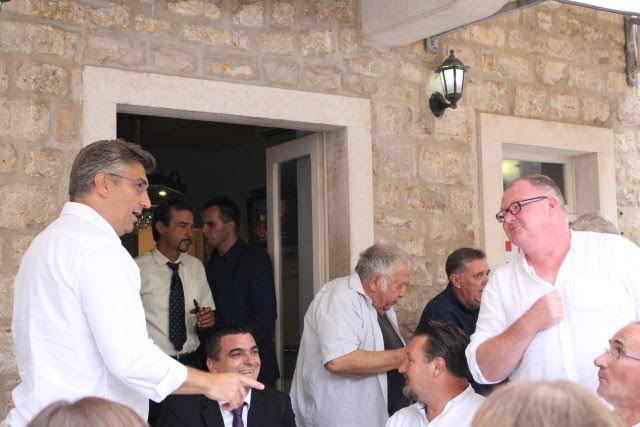
Seven years later, we are still not read in North Korea, and I still don't really know what I am doing, but TCN continues to thrive thanks to our fabulous team and loyal readers (and big shout out to the trolls, who keep us smiling). Croatia is changing, and so is TCN's direction - away from a focus on tourism into the world of business, entrepreneurship, social enterprise, and remote work.
There are many stories to be told, many initiatives to push, and a lot of fun to be had on the way. To the many people who have been a part of the TCN journey - including those with whom I have had differences - my heartfelt thanks. Having the best job in the world and enjoying the best lifestyle in the world is an incredible experience. Thank you for your part in that.
****
What is it like to live in Croatia? An expat for 20 years, you can follow my series, 20 Ways Croatia Changed Me in 20 Years, starting at the beginning - Business and Dalmatia.
Follow Paul Bradbury on LinkedIn.
Croatia, a Survival Kit for Foreigners will be out by Christmas. If you would like to reserve a copy, email This email address is being protected from spambots. You need JavaScript enabled to view it. Subject 20 Years Book
Osijek Mayor Ivan Radic Avoids Inflationary Woes in Eastern Croatian City
July the 30th, 2022 - Osijek mayor Ivan Radic has discussed the woes of inflation which have the entire country, continent and indeed the world in a very firm grip, and just how the Eastern Croatian city he is in charge of has managed to avoid many price hikes.
As Poslovni Dnevnik writes, Osijek mayor Ivan Radic recently made a statement to N1 television about inflation, price increases and how Osijek has managed to avoid many unpleasant situations in the face of a very uncomfortable inflation wave following the Russian invasion of Ukraine back in February.
"I'm happy with what we managed to do as a team. We launched a lot of projects, even thirty years ago, nowhere near this much was ever invested in Osijek,'' stated Radic when discussing the first year of his mandate as the city's mayor, also going on to announce that he plans to keep the same pace in the coming years.
The renovation of the pedestrian bridge, the swimming pool, the Drava river's banks... There are numerous projects that are being worked on in Osijek, and there appears to be no plans to stop.
"The pedestrian bridge had to be rebuilt because the statics were damaged and the bridge has become dangerous, and the works on the bridge's reconstruction were completed before the agreed deadline,'' Osijek mayor Ivan Radic said.
When asked about saving energy, which is also being strongly recommended by the European Commission (EC), Radic explained that they have already started saving in many ways in the City of Osijek.
"Much like any other city you can think of, Osijek is far from immune to these things. We immediately issued recommendations to the entire city system, we gave them very specific recommendations that must be followed. We found that cooling by one degree less leads to 15 percent energy savings, which is a massive 100,000 kuna per month. That's a nice amount of savings, and we started with it all on time. The City of Osijek hasn't increased the price of any of its services, neither water nor electricity, nor kindergarten charges, nor transport costs,'' concluded Osijek mayor Ivan Radic.
For more, make sure to check out our dedicated politics section.
Croatian Tourism Company Valamar Riviera Publishes 2022 Results So Far
July the 30th, 2022 - The massive Croatian tourism company Valamar Riviera has published the results it has acheived during the first six months of this year, and they're in stark contrast to the situation just one year ago, never mind two.
As Poslovni Dnevnik writes, in the first half of 2022, the Croatian tourism company Valamar Riviera achieved an impressive 2.1 million overnight stays with business revenues of 677.5 million kuna, which is comparable to the volume of business in the first six months of the pre-crisis, record year of 2019.
The growth of business income in the first half of 2022 is mostly the result of the growth of average prices, which are roughly 8 percent higher when compared to how much they were back in 2019. The best results were recorded in the premium segment, especially in the part of campsites and car destinations.
However, increased costs, primarily of electricity, labour and food products had a significant impact on profitability overall. The operating profit for the first six months stands at 58 million kuna less than in 2019, which is entirely the result of increased electricity costs of 37 million kuna and labour costs of 22 million kuna.
With the aim of increasing the attractiveness of key professions in tourism and providing the best working conditions in the sector, the Croatian tourist company Valamar launched the ''First for a reason/Prvi s razlogom'' campaign this year. For this year, a total of 15 million euros have been set aside for salary increases and various reward programmes. This year, Valamar is once again among the TOP 10 most desirable Croatian employers of all, and is still the best employer in the tourism sector.
The investment cycle in hotels, summer resorts and campsites managed by the Croatian tourism company Valamar for 2022 amounted to a massive 530 million kuna. Dalmacija [PLACESHOTEL] by Valamar in Makarska, the newly built Valamar Amicor Green Resort in Stari Grad on the island of Hvar and Corinthia Baska Sunny hotel by Valamar on the island of Krk were all successfully opened. This season's investments include new facilities at Istra Premium Camping Resort and the Lanterna Premium Camping Resort in Porec, as well as the construction of a beach near the Valamar Padova Hotel on the island of Rab. The new Valamar House for housing seasonal employees down in Dubrovnik was also opened.
The Croatian tourism company Valamar has also expanded its portfolio in nearby Austria with the acquisition of the Kesselspitze 5* Hotel, which has become the third hotel under Valamar's management in Obertauern, Austria. As the first Valamar Collection hotel in Austria, it will open in the winter season of 2022/2023.
Valamar Riviera is otherwise the very first tourism company in Croatia to have integrated sustainable development into its business and development management and published a new sustainability strategy and set of ESG goals until the year 2025. The strategy includes 12 key goals in the field of environment (E), society (S) and management (G) that Valamar plans to achieve through 6 strategic initiatives until the aforementioned year.
For more, make sure to check out our dedicated business section.
How Much Does Average Family Need for a Week on Croatian Coast?
July the 30th, 2022 - Just how much does the average family need to set aside financially for a comfortable week spent on the Croatian coast?
As Poslovni Dnevnik writes, summer on the Croatian coast is the ultimate experience for very many foreign visitors to our shores, but that experience really does come with a hefty price tag, especially in the Dalmatian city of Zadar. Zadar, at least according to the latest research, is the most expensive city in the Republic of Croatia, as reported by N1.
According to the data from the Croatian Bureau of Statistics (CBS), an average four-member family with an income of 10,000 kuna per month would need to set aside around 2,000 euros for a comfortable seven-day holiday on the Croatian coast. Most people earning a typical Croatian salary can't afford that.
The City of Zadar is one of the top destinations for summer holidays on the Croatian coast, both for foreign and domestic tourists. The only question is just how many people earning Croatian salaties can actually afford it.
"You need around 1,500 kuna for four days, with accommodation, then it's about 2,500 kuna. I don't think the average family can afford that," said one Croatian resident when asked.
The cost of living in Zadar, according to the well-known website for tracking the cost of living, Numbeo, is twice as high as the standard and amounts to around 20,000 kuna. The average family would need to pay out around 400 to 500 kuna just for a walk and some time spent around Kalelarga (a very popular street in the heart of Zadar). That is too much even for the locals.
It costs 100 euros per night for a room and another 100 euros is needed to go out and have a good time, according to local Zadar residents. For seven days in Zadar, and from the beginning of the story, the average family would need to pay around 300 euros per evening in the centre of the city, and between 150 and 200 euros per evening outside the city in places like Vir, Iz or Bibinje. That is about 2,000 euros or two average Croatian monthly salaries.
The price of food and drink also depends on the depth of any given wallet...
"The prices are now higher than they were back during the first of July, but even those prices have their own market and demand. A family of four can still find an apartment in Zadar for 80 to 100 euros per night," said Daniel Radeta, the president of the Zadar Association of Renters. The price of food and drink depends on the balance a person has in their wallet. Residents of Zadar point out that 100 euros per day is enough, even though restaurateurs have raised their prices by 10 percent.
"One round of drinks for four of people comes in at 100 kuna, and that's the cheapest, so coffee and mineral water. If people fancy an alcoholic cocktail, then that's double the price,'' pointed out the president of the Catering Guild at OK Zadar, Robert Kovacevic.
''One meal is from 40 to 100 euros for a family, so that's why you should be careful where you choose to come and sit down. One lunch and dinner for two are around 40 euros. And for four, with a bottle of wine, it's about 100 euros or more," explained Dominik the waiter, who revealed that 90 percent of the people who do this are foreigners, and that there are almost no locals engaging in similar behaviour on the Croatian coast. After lunch, you should cool down. The best solution is ice cream. N1 found a place where a single scoop of ice cream comes in at a price of 12 kuna.
“It's not a big price at all. There are places where a scoop costs 18 kuna,'' said ice cream seller Katarina.
Even going into the sea itself is no longer a free pleasure in some places along the Croatian coast. In Petrcane, entrance to a private beach costs 50 kuna, and the prices on the public beach are the same as everywhere else else: coffee and a sandwich are around 50 kuna, and other pleasures cost between 100 and 300 kuna. A tour of any nearby islands is about 40 euros per person. However, most cash is spent on street food and souvenirs. The prices in Zadar are now fairly steep, but foreign guests still don't complain.
"Yes, I think it's more expensive here than in some other countries in Europe, but the prices are a bit cheaper than they are in Sweden," said one Swedish tourist.
For more, make sure to check out our dedicated travel section.
Novalja Introduces Water Restrictions, Bans Watering Gardens, Filling Pools
July the 30th, 2022 - Following Istria County, Novalja has become the next tourist destination to introduce restrictions on water consumption/usage, banning the watering of gardens and green spaces, the re-filling of swimming pools, and even car washing.
The heatwave is ongoing, despite little refreshing breaks of violent storms, lightning and heavy rain (which are painfully few and far between), and more destinations across the country are tightening their belts when it comes to water usage.
As Poslovni Dnevnik writes, due to the record consumption of water in Novalja on the island of Pag, there has been a ban introduced on the filling up of swimming pools, watering gardens and green areas, and washing cars and yards with the use of water from the water supply system while there is enough water for general consumption and it is of good quality, according to the local municipal company Komunalija.
The Director of Komunalija, Neven Korda, told Novalja's residents and tourists alike that the first level of restrictions on water use will be in effect until further notice, as consumption of over 10,500 cubic metres of water per day has been reached, as reported by Fenix magazine.
"Saving water on the islands during the warm summer months is a very common thing, especially when there are a lot of tourists visiting, like there are now," said Korda, pointing out that "back during the record year of 2019, daily consumption didn't exceed 10,000 cubic metres. So there is water, it's of good quality, the pressure is good, but the first level of reduction was introduced merely as a preventive measure to prevent any further problems from occurring,'' concluded Korda.
He added that water comes to the island of Pag and as such to Novalja from Vodovod Hrvatsko primorje - the southern branch of Senj, and from Sveti Juraj, which is the location of the Senj Hydropower Plant, the quantities are currently fairly limited.
For more, make sure to check out our dedicated lifestyle section.



